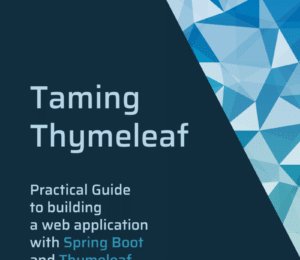Jakarta EE 11: Beyond the Era of Java EE
This user guide provides a brief history of Java EE/Jakarta EE and a detailed overview of some of the specifications that will be updated in Jakarta EE 11.
Step up your coding with the Continuous Feedback Udemy Course: Additional coupons are available
What do you know about the code changes that were just introduced into the codebase? When will you notice if something goes wrong?
Stable, Secure, and Affordable Java
Azul Platform Core is the #1 Oracle Java alternative, offering OpenJDK support for more versions (including Java 6 & 7) and more configurations for the greatest business value and lowest TCO.
Do you want your ad here?
Contact us to get your ad seen by thousands of users every day!
[email protected]Foojay Podcast #67: Writing a book. Does it make you rich and famous?
Table of Contents VideoPodcast AppsGuestsTrisha GeeLen EppWim DeblauweMarián VargaLinksBook by FrankBooks and links by Trisha GeeBooks by Wim DeblauweBook by Marián VargaLeanpubLuluContent Let me share a personal story. I started experimenting with Java on a Raspberry Pi about five years ...
I always struggled with how to implement equals and hashcode, until I learned about the difference between entities and value objects.
To correctly implement equals() and hashCode(), it is important to first determine if your object is a value object or an entity.
If it is one of the those, you can follow the rules set forth in this article. If it is neither (e.g., a Controller, Service, Repository) then you probably don’t want to override the methods.
One of the things that distinguishes a decent API from one that is a pleasure to work with is robust error handling. Nothing is more frustrating than using some API and getting back cryptic errors where you can only guess why the server is not accepting your request.
Spring Boot lets you customize the error handling for your application, but there is quite a lot of low-level coding involved if you want to do this correctly.
Spring Boot is heavily promoted as the best way to write REST API’s in Java, but it can also be used as a very good alternative to Laravel/PHP, Rails/Ruby, or Django/Python to write server-side rendered HTML for Java developers.
When combining the ease of use of Spring Boot with the power of Java and the easy templating of Thymeleaf, you have a very powerful combination that makes Java developers extremely productive to write web applications.
The book Taming Thymeleaf teaches you step-by-step how to get started with those technologies and build a fully fledged web application including security, validation, internationalization, testing and more.
The hottest #Java unconference in the world is coming back 27-31 July 2026 (starting evening of 26th). Deep discussions about Java and life. We are making some seats available using a lottery system. Draw will be on Friday the 20th Feb. Sign up here: https://www.jcrete.org/lottery
Confession: I usually lose the Flow switching between Quality Gates and Code 📉😅
But I connected @claudeai + #SonarQube via #MCP
Verify & Fix vulnerabilities without touching the mouse.
Zero context switching. Pure flow. 🚀
https://foojay.io/today/claude-code-sonarqube-mcp/
#Java #AI @foojayio
Hola Java devs! 👋 The #SonarQube AI Code Assurance #article is LIVE on @foojayio ! 🎉
Stop just finding bugs. 🛑 Use SonarQube's new AI "Magic Button" to auto-fix them instantly! 🤯🪄
Crush that tech debt fast. 🚀☕️ #Java #AI @SonarSource
https://foojay.io/today/sonarqube-part-4-ai-code-assurance/

